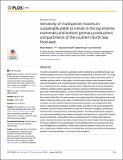Files in this item
Sensitivity of multispecies maximum sustainable yields to trends in the top (marine mammals) and bottom (primary production) compartments of the southern North Sea food-web
Item metadata
| dc.contributor.author | Stäbler, Moritz | |
| dc.contributor.author | Kempf, Alexander | |
| dc.contributor.author | Smout, Sophie | |
| dc.contributor.author | Temming, Axel | |
| dc.date.accessioned | 2019-01-30T11:29:13Z | |
| dc.date.available | 2019-01-30T11:29:13Z | |
| dc.date.issued | 2019-01-28 | |
| dc.identifier | 257557958 | |
| dc.identifier | f3e94ed7-32cd-4ab1-b484-c3d4d90ca67d | |
| dc.identifier | 85060579711 | |
| dc.identifier | 000457041800013 | |
| dc.identifier.citation | Stäbler , M , Kempf , A , Smout , S & Temming , A 2019 , ' Sensitivity of multispecies maximum sustainable yields to trends in the top (marine mammals) and bottom (primary production) compartments of the southern North Sea food-web ' , PLoS ONE , vol. 14 , no. 1 , e0210882 . https://doi.org/10.1371/journal.pone.0210882 | en |
| dc.identifier.issn | 1932-6203 | |
| dc.identifier.other | RIS: urn:D941196D5925FA89E4E698CCACC9E183 | |
| dc.identifier.uri | https://hdl.handle.net/10023/16959 | |
| dc.description | The authors (MS, AK, SS, AT) gratefully acknowledge financial support through the European Commission’s MYFISH project (Maximising yield of fisheries while balancing ecosystem, economic and social concerns, FP7/2007-2013 under grant agreement n°289257; http://myfishproject.eu). | en |
| dc.description.abstract | In marine ecosystems, maximum sustainable yield considerations are affected by any substantial changes that occur in the top and bottom compartments of the food-web. This study explores how the southern North Sea’s fisheries may need to adjust their fishing efforts to maintain optimum yields of sole, plaice, cod and brown shrimps under increased marine mammal populations and a reduced primary productivity. We constructed plausible scenarios of ongoing food-web changes using the results of Bayesian age-structured population models to estimate carrying capacities of harbour porpoises (Phocoena phocoena) and grey seals (Halichoerus grypus). Losses in primary productivity were predicted by lower trophic level ecosystem models. These scenarios were implemented in a food-web model of the southern North Sea. For each scenario, we sought mixed-fleet fishing efforts that would deliver maximum yields of sole, plaice, cod and brown shrimp combined. We also did so for a baseline run with unaltered mammal and primary production, and compared the differences in optimal fishing strategies, predicted yields, and states of the stocks between the scenarios. We found stocks and yields to be far more sensitive to changes in primary productivity than to increased marine mammal predation. The latter predominantly impacted cod, and even benefitted brown shrimps compared to the baseline run. Under 30% reduced primary productivity, fishing efforts had to be reduced by 50% to still provide maximum yields, whereas the marine mammal scenario induced no need to adjust the fishing regime. This draws attention to the potential gains of incorporating bottom-up processes into long-term management considerations, while marine mammal predation may be less of a concern, in particular for flatfish fisheries in the North Sea, and may even benefit shrimp trawlers because of reduced predation on shrimp from fish predators. | |
| dc.format.extent | 18 | |
| dc.format.extent | 2878620 | |
| dc.language.iso | eng | |
| dc.relation.ispartof | PLoS ONE | en |
| dc.subject | QH301 Biology | en |
| dc.subject | NDAS | en |
| dc.subject | SDG 14 - Life Below Water | en |
| dc.subject.lcc | QH301 | en |
| dc.title | Sensitivity of multispecies maximum sustainable yields to trends in the top (marine mammals) and bottom (primary production) compartments of the southern North Sea food-web | en |
| dc.type | Journal article | en |
| dc.contributor.sponsor | European Commission | en |
| dc.contributor.institution | University of St Andrews. School of Biology | en |
| dc.contributor.institution | University of St Andrews. Sea Mammal Research Unit | en |
| dc.contributor.institution | University of St Andrews. Scottish Oceans Institute | en |
| dc.contributor.institution | University of St Andrews. Centre for Research into Ecological & Environmental Modelling | en |
| dc.identifier.doi | 10.1371/journal.pone.0210882 | |
| dc.description.status | Peer reviewed | en |
| dc.identifier.grantnumber | 289257 | en |
This item appears in the following Collection(s)
Items in the St Andrews Research Repository are protected by copyright, with all rights reserved, unless otherwise indicated.

